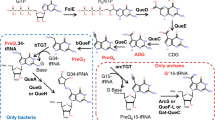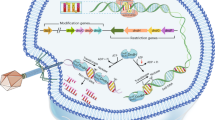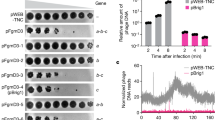Abstract
HOST-controlled restriction modification systems usually prevent the survival of unmodified genomes in bacterial cells1–4. Phage DNA can be modified by methylation (λ, and f1)5–7 or by glucosylation (T-even phages3). Modification of the λ genome is mediated by a host methylase8 whereas modification of the T4 genome is by phage coded α- and β-glucosyl transferases9. The restriction systems of E. coli (rgl) acting on non-glucosylated (glu−) T-even phages are called r6 and r2,4 (ref. 10): r6 restricts all glu− T-even phages, whereas r2,4 restricts only T2 and T4 glu− phages. Hattman and Fukasawa11 showed that when glu+ T4 DNA was injected into an rgl+ uridine diphosphoglucose (UDPG) pyrophosphorylaseless mutant, the progeny glu− DNA replicated and was matured into virions which they called T*. To explain why the replicating glu− progeny DNA is not restricted in the rgl+ host while the entering T* virion DNA is, Fukasawa12 postulated that the rgl system is localised in the membrane. Incoming glu− parental DNA would be restricted during passage through the membrane. Incoming glu+ parental DNA (which is not restricted) would be replicated as glu− DNA in the absence of UDPG. Since the replicating DNA is not subject to the restriction system localised in the membrane it should not be restricted. Not surprisingly, r6 was shown to be localised in the membrane13,14. There is, however, good evidence that r2,4 can restrict replicating DNA15,16 and is, at least in that sense, cytoplasmic. Thus, the question why r2,4 does not restrict unmodified progeny DNA is still unresolved. We report here that the phage specifies a protein which prevents the action of r2,4. The anti-r2,4 activity specified by the modified parental genome prevents restriction of the unmodified progeny DNA by r2,4.
This is a preview of subscription content, access via your institution
Access options
Subscribe to this journal
Receive 51 print issues and online access
$199.00 per year
only $3.90 per issue
Buy this article
- Purchase on Springer Link
- Instant access to full article PDF
Prices may be subject to local taxes which are calculated during checkout
Similar content being viewed by others
References
Luria, S. E., and Human, H. L., J. Bact., 64, 557–569 (1952).
Bertani, G., and Wiegle, J. J., J. Bact., 65, 113–121 (1953).
Revel, H. R., and Luria, S. E., A. Rev. Genet., 4, 177–192 (1970).
Arber, W., in Progress in Nucleic Acid Research and Molecular Biology, 14 (edit. by Cohn, W. E.), 1–34 (Academic, New York, 1974).
Arber, W., J. molec. Biol., 11, 247–256 (1965).
Kuhnlein, K., and Arber, W., J. molec. Biol., 63, 9–19 (1972).
Nathans, D., and Smith, H. O., A. Rev. Biochem., 44, 273–293 (1975).
Meselson, M., Yuan, R., and Heywood, J., A. Rev. Biochem., 44, 447–466 (1972).
Kornberg, S. R., Zimmerman, S. B., and Kornberg, A., J. biol. Chem., 236, 1487–1493 (1961).
Revel, H. R., Virology, 31, 688–701 (1967).
Hattman, S., and Fukasawa, T., Proc. natn. Acad. Sci. U.S.A., 50, 297–305 (1963).
Fukasawa, T., J. molec. Biol., 9, 525–536 (1964).
Silverstein, J., and Goldberg, E. B., Virology (in the press).
Hewlett, M. J., and Mathews, C. K., J. Virol., 15, 776–784 (1975).
Fleischman, R. A., and Richardson, C. C., Proc. natn. Acad. Sci. U.S.A., 68, 2527–2531 (1971).
Dharmalingam, K., and Goldberg, E. B., Nature, 260, 000–000 (1976).
Tanner, D., and Oishi, M., Biochim. biophys. Acta, 228, 764–769 (1971).
Sakaki, Y., J. Virol., 15, 1611–1612 (1974).
Cornett, J. B., J. Virol., 13, 312–321 (1974).
Shah, D. H., and Berger, H. J., molec. Biol, 57, 17–34 (1971).
Studier, F. W., J. molec. Biol., 11, 373–390 (1965).
Altman, S., and Meselson, M., Proc. natn. Acad. Sci. U.S.A., 66, 716–721 (1970).
Lark, C., and Arber, W., J. molec. Biol., 52, 337–348 (1970).
Heib, J., Rolfe, B., and Shell, J., Virology, 59, 356–370 (1974).
Silverstein, J., and Goldberg, E. B., Virology (in the press).
Zissler, J., Signer, E. R., and Schaefer, F., in The Bacteriophage Lambda (edit by Hershey, A. D.), 455–468 (Cold Spring Harbor Laboratory, New York, 1971).
Author information
Authors and Affiliations
Rights and permissions
About this article
Cite this article
DHARMALINGAM, K., GOLDBERG, E. Phage-coded protein prevents restriction of unmodified progeny T4 DNA. Nature 260, 454–456 (1976). https://doi.org/10.1038/260454a0
Received:
Accepted:
Issue Date:
DOI: https://doi.org/10.1038/260454a0
This article is cited by
-
Genomes of the T4-related bacteriophages as windows on microbial genome evolution
Virology Journal (2010)
-
Heat shock-induced relaxation of restriction enzyme specificity inEscherichia coli
Journal of Genetics (1991)
Comments
By submitting a comment you agree to abide by our Terms and Community Guidelines. If you find something abusive or that does not comply with our terms or guidelines please flag it as inappropriate.



